TikTok trends and health influencers have sparked interest in drinking olive oil straight from the spoon, but how much should people actually consume daily? While olive oil offers proven health benefits, the answer depends on individual factors like activity level, overall diet, and health goals.
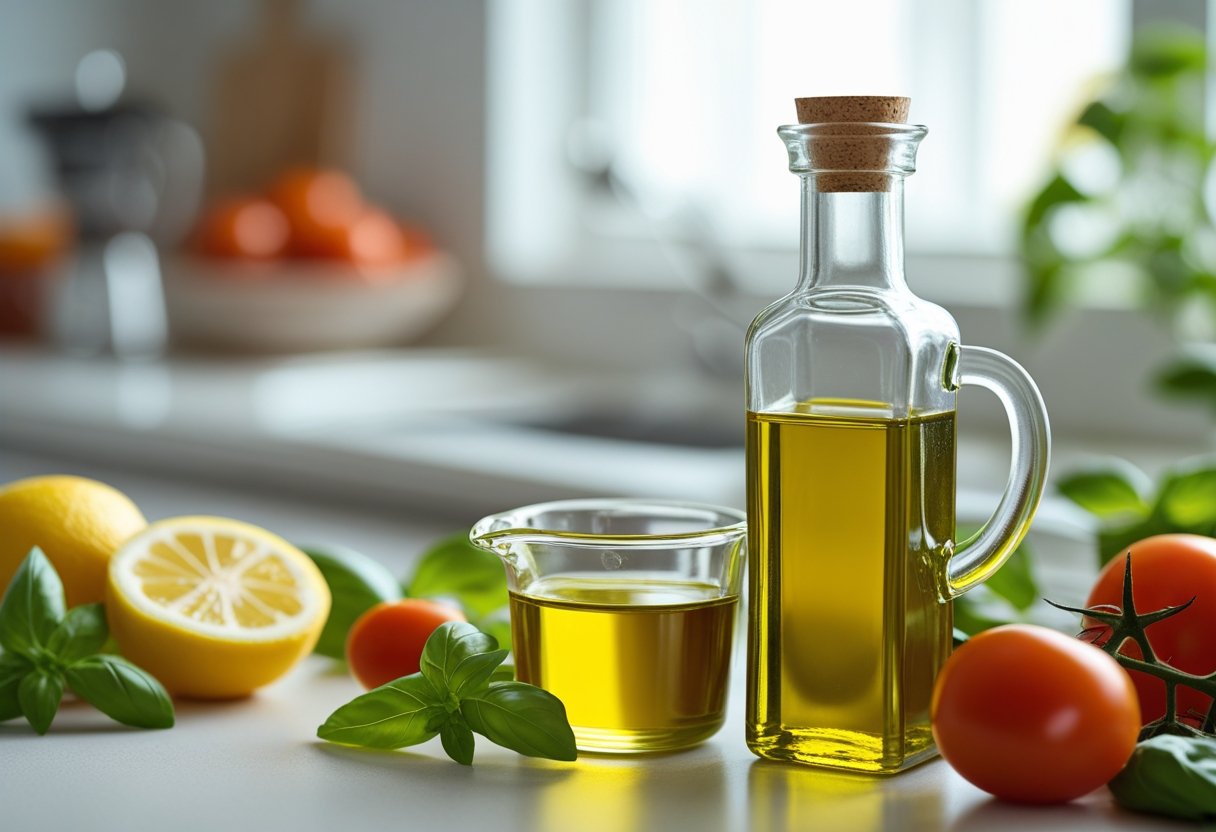
Most health experts recommend consuming 1-2 tablespoons of olive oil per day, which can include both drinking and cooking with the oil. Research shows that consuming just over half a tablespoon daily is linked to a 28% lower risk of death from dementia[1], while other studies indicate benefits can be seen with as little as half a teaspoon daily[2].
The practice of drinking olive oil has gained attention as people seek to maximize its anti-inflammatory properties and heart health benefits. However, timing, quality, and preparation methods all play important roles in determining how much someone should drink versus use in cooking.
Key Takeaways
- The recommended daily intake is 1-2 tablespoons of olive oil, whether consumed directly or used in cooking
- Extra virgin olive oil provides the most health benefits due to its higher concentration of antioxidants and polyphenols
- Drinking olive oil with meals enhances nutrient absorption and provides better digestive benefits than consuming it alone
How Much Olive Oil Should You Drink A Day?
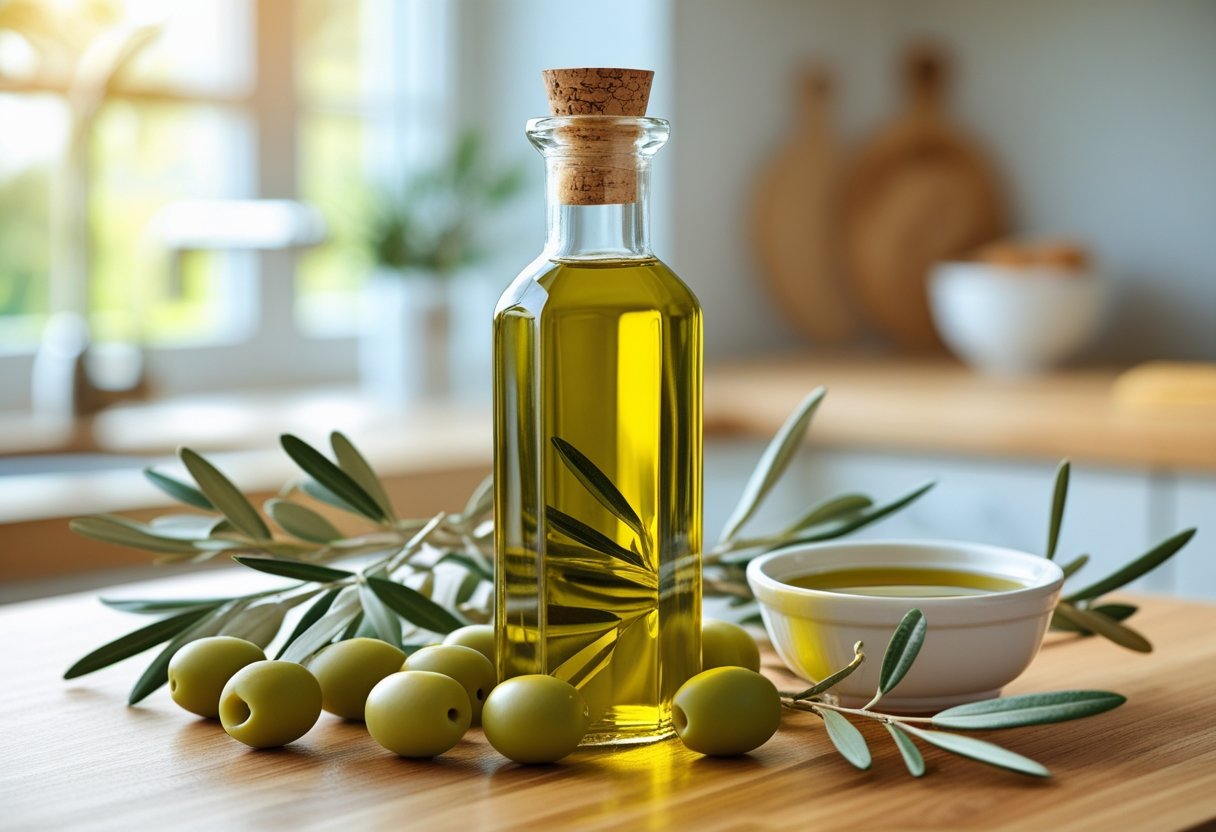
The optimal daily amount of olive oil varies from person to person, but most health experts recommend between 1-4 tablespoons per day. Studies show health benefits from consuming at least half a teaspoon daily[2], while Mediterranean populations often consume much more.
Recommended Daily Amounts
Most nutrition experts suggest starting with 1-2 tablespoons of extra virgin olive oil daily. This provides approximately 120-240 calories and delivers key health compounds.
The minimum amount for heart health benefits is about 1 tablespoon[1]. This serving contains roughly 14 grams and 119 calories.
For maximum benefits, some studies support up to 4 tablespoons daily. However, this upper limit should align with overall calorie needs.
Daily Olive Oil Recommendations:
- Minimum effective dose: 1/2 teaspoon (2.5ml)
- Standard recommendation: 1-2 tablespoons (15-30ml)
- Mediterranean diet levels: 2-4 tablespoons (30-60ml)
- Upper safe limit: 4 tablespoons (60ml)
People following low-fat diets should stick to the lower end. Those on Mediterranean or ketogenic eating plans can consume more.
Factors That Affect Your Ideal Intake
Several personal factors determine the right amount of olive oil for each individual. Total caloric needs, existing diet, and health goals all influence optimal intake[1].
Activity level plays a major role. Active athletes need more calories and can handle 3-4 tablespoons daily. Sedentary individuals should limit intake to 1-2 tablespoons.
Current diet composition matters significantly. People already eating nuts, avocados, and seeds get fats from other sources. They need less olive oil than those replacing butter or margarine.
Health objectives guide dosing decisions. Those focused on heart health may benefit from 2-4 tablespoons daily for anti-inflammatory effects. Weight management goals typically call for 1-2 tablespoons.
Age and gender also influence needs. Older adults and women generally require fewer total calories and less olive oil.
Expert and Scientific Guidelines
Research consistently supports moderate daily olive oil consumption for health benefits. A recent study found that consuming just over half a tablespoon daily linked to 28% lower risk of dementia-related death[1].
Mediterranean diet research provides strong evidence for higher intake levels. Studies show olive oil consumption was associated with 8% to 34% lower risk of disease-related death over 28 years[3].
Quality matters as much as quantity. Extra virgin olive oil (EVOO) contains the highest levels of beneficial polyphenols and antioxidants. Refined olive oils provide fewer health compounds.
Most dietitians recommend consuming olive oil with meals rather than alone. This improves absorption of fat-soluble vitamins and helps stabilize blood sugar.
The key is finding a sustainable amount that fits within total daily calories while providing meaningful health benefits.
Types of Olive Oil and Their Nutritional Profiles
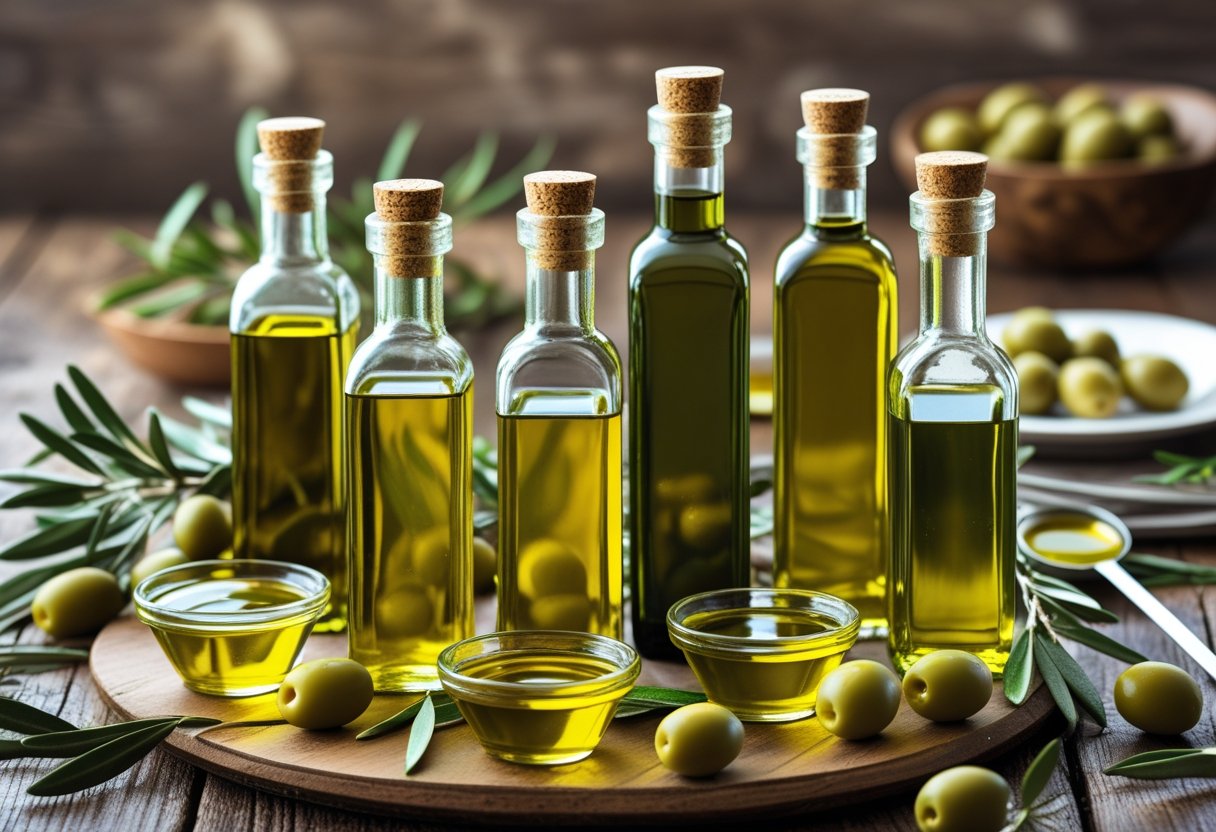
Different types of olive oil contain varying levels of beneficial compounds and healthy fats. Extra virgin olive oil offers the highest nutritional value[4] due to minimal processing, while refined versions provide fewer health benefits.
Extra Virgin Olive Oil vs. Virgin Olive Oil
Extra virgin olive oil (EVOO) represents the gold standard of olive oils. It contains the highest levels of antioxidants and polyphenols[4] because it undergoes no chemical processing.
EVOO gets extracted through cold pressing without heat or chemicals. This process preserves beneficial compounds that provide anti-inflammatory properties.
Virgin olive oil also comes from mechanical extraction. However, it has slightly higher acidity levels than extra virgin varieties.
Key Nutritional Differences:
| Oil Type | Acidity Level | Antioxidant Content | Processing Method |
|---|---|---|---|
| Extra Virgin | Less than 0.8% | Highest | Cold pressed |
| Virgin | Less than 2% | High | Mechanical extraction |
The higher polyphenol content in EVOO creates the bitter and peppery taste. These compounds provide many of olive oil’s cardiovascular and anti-inflammatory benefits[4].
Refined Olive Oil and Light Olive Oil
Refined olive oil undergoes chemical processing and heat treatment. This removes most beneficial compounds found in unrefined versions.
Light olive oil contains mostly refined oil with small amounts of virgin oil added. The term “light” refers to flavor, not calorie content.
One tablespoon of any olive oil provides 119 calories and 14 grams of fat[5], regardless of processing level.
Nutritional Impact of Processing:
- Heat treatment destroys antioxidants
- Chemical refining removes polyphenols
- Vitamin E content decreases significantly
- Basic fat structure remains unchanged
Refined oils have neutral flavors and higher smoke points. They work better for high-heat cooking but provide fewer health benefits.
Monounsaturated Fats and Healthy Fats in Olive Oil
All olive oils contain approximately 73% monounsaturated fats, primarily oleic acid. These healthy fats support heart health and help reduce inflammation.
The FDA recognizes that 1.5 tablespoons of oleic acid-rich oils daily may reduce coronary heart disease risk[4] when replacing saturated fats.
Fat Composition in Olive Oil:
- Monounsaturated fats: 73% (mainly oleic acid)
- Saturated fats: 14%
- Polyunsaturated fats: 11%
Monounsaturated fats help lower bad LDL cholesterol while maintaining good HDL cholesterol. They also improve insulin sensitivity and blood sugar control.
Olive oil provides vitamins E and K along with trace amounts of potassium[5]. Vitamin E acts as an antioxidant that protects cells from damage.
The combination of healthy fats and antioxidants makes olive oil particularly beneficial. This explains why Mediterranean populations with high olive oil consumption show lower rates of heart disease.
Health Benefits of Daily Olive Oil Consumption
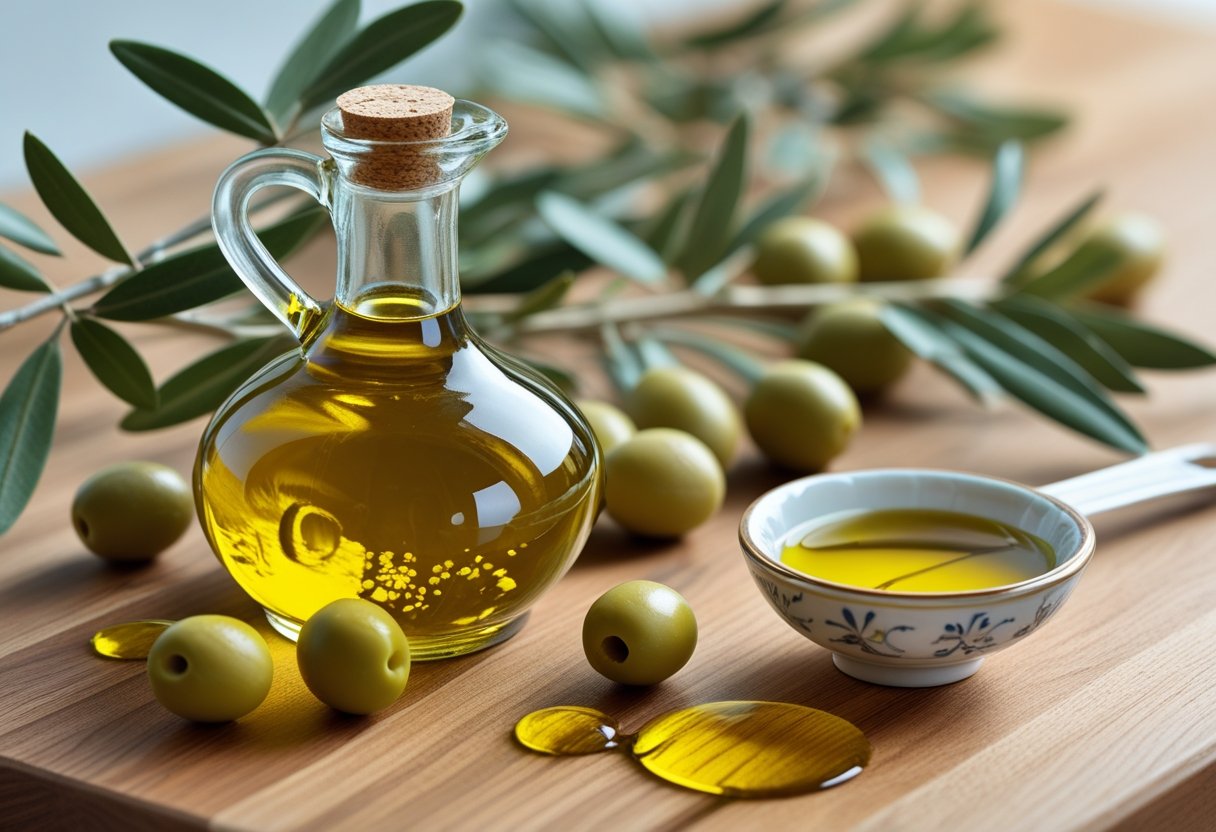
Daily olive oil intake provides measurable improvements to cardiovascular health, reduces chronic inflammation, and supports brain function through its rich concentration of monounsaturated fats and polyphenols. The oil’s vitamin E content and antioxidants also contribute to healthier skin and cellular protection.
Support for Heart and Cholesterol Health
Olive oil’s monounsaturated fats directly improve cholesterol profiles by raising HDL (good) cholesterol while lowering LDL (bad) cholesterol levels. Studies show that consuming 2 tablespoons daily can provide heart health benefits[6] without exceeding recommended caloric intake.
The polyphenols in extra virgin olive oil protect blood vessels from damage and improve arterial flexibility. These compounds prevent the oxidation of LDL cholesterol, which is a key step in developing heart disease.
Regular consumption helps reduce blood pressure naturally. The anti-inflammatory properties of olive oil decrease stress on the cardiovascular system.
Key Heart Benefits:
- Improved cholesterol ratios
- Lower blood pressure
- Reduced arterial inflammation
- Better blood vessel function
Anti-Inflammatory and Antioxidant Effects
Olive oil contains powerful antioxidants that neutralize free radicals throughout the body. The main antioxidant compound, oleocanthal, works similarly to ibuprofen but without side effects when consumed regularly.
Polyphenols in olive oil reduce markers of chronic inflammation like C-reactive protein. This inflammation reduction helps protect against diabetes, arthritis, and certain cancers.
The antioxidants in olive oil include vitamin E, beta-carotene, and phenolic compounds. These work together to protect cells from oxidative stress that leads to premature aging and disease.
Daily consumption creates a cumulative anti-inflammatory effect. The body builds up these protective compounds over time, providing ongoing cellular protection.
Cognitive Function and Brain Health
Research shows that olive oil consumption reduces dementia risk by 28%[1] regardless of overall diet quality. The monounsaturated fats support brain cell membrane health and improve communication between neurons.
Polyphenols cross the blood-brain barrier and protect against cognitive decline. These compounds reduce brain inflammation that contributes to Alzheimer’s disease and other neurodegenerative conditions.
The vitamin E in olive oil protects brain cells from free radical damage. This antioxidant is especially important for maintaining memory and learning abilities as people age.
Regular olive oil intake supports better blood flow to the brain. Improved circulation delivers more oxygen and nutrients to brain tissue.
Skin Health and Anti-Aging Benefits
Vitamin E in olive oil protects skin cells from UV damage and environmental pollutants. This fat-soluble vitamin helps maintain skin elasticity and prevents premature wrinkles.
The antioxidants in olive oil combat free radicals that break down collagen and elastin. These proteins keep skin firm and smooth, and olive oil helps preserve their structure.
Monounsaturated fats support the skin’s natural moisture barrier. This helps prevent dryness and maintains healthy skin texture from the inside out.
Skin Benefits Include:
- Reduced signs of aging
- Better moisture retention
- Protection from environmental damage
- Improved skin elasticity
Polyphenols in olive oil also reduce skin inflammation. This can help with conditions like eczema and dermatitis when consumed regularly.
Potential Side Effects and Considerations
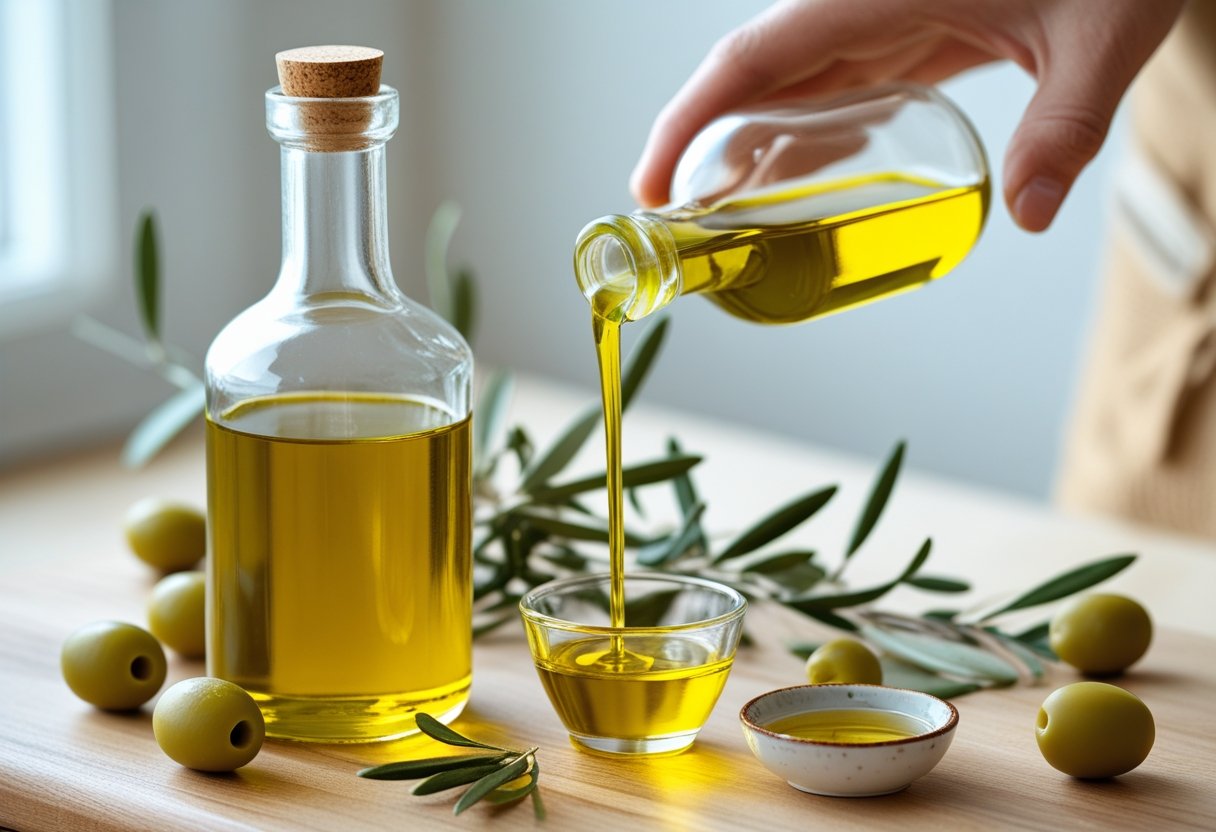
While drinking olive oil offers health benefits, it comes with important considerations regarding calories, digestion, and individual health needs. Understanding these factors helps people make informed decisions about their daily olive oil intake.
Calorie Content and Weight Management
Olive oil is extremely calorie-dense, containing about 120 calories per tablespoon. A full cup contains around 1920 calories and 218 grams of fat[7], making portion control essential for weight management.
People trying to lose or maintain weight need to account for olive oil calories in their daily intake. Just two tablespoons add 240 calories to someone’s diet without providing protein or carbohydrates.
Daily Calorie Impact:
- 1 tablespoon = 120 calories
- 2 tablespoons = 240 calories
- 3 tablespoons = 360 calories
Those with sedentary lifestyles may find that drinking olive oil regularly leads to unwanted weight gain. Active individuals have more flexibility but should still monitor their total calorie intake.
The key is balancing olive oil consumption with overall dietary goals and physical activity levels.
Possible Digestive Issues
Drinking olive oil, especially in larger amounts, can cause digestive problems for many people. High fat content can lead to upset stomach, diarrhea, nausea, and vomiting[7].
People with sensitive stomachs may experience discomfort even with small amounts. Starting with one teaspoon and gradually increasing helps assess individual tolerance.
Common digestive side effects include:
- Stomach cramping
- Loose stools
- Nausea
- Bloating
Those with gallbladder issues should be particularly cautious, as high-fat foods can trigger symptoms. People with irritable bowel syndrome may also experience flare-ups from consuming olive oil on an empty stomach.
Taking olive oil with food rather than alone often reduces digestive upset.
Interactions with Special Diets or Health Conditions
Olive oil can interact with certain medications and health conditions, requiring careful consideration. It may lower blood pressure excessively when combined with blood pressure medications[8] and can affect blood sugar levels in people taking diabetes drugs.
People following ketogenic diets may incorporate more olive oil, but they still need to monitor total calorie intake. Those on low-fat diets for medical reasons should consult healthcare providers before drinking olive oil regularly.
Important considerations:
- Blood pressure medications
- Diabetes medications
- Gallbladder conditions
- Digestive disorders
Individuals with cardiovascular disease should discuss olive oil consumption with their doctors, as excessive amounts may contribute to atherosclerotic plaque formation[8] despite its heart-healthy reputation in moderation.
Best Practices for Drinking Olive Oil
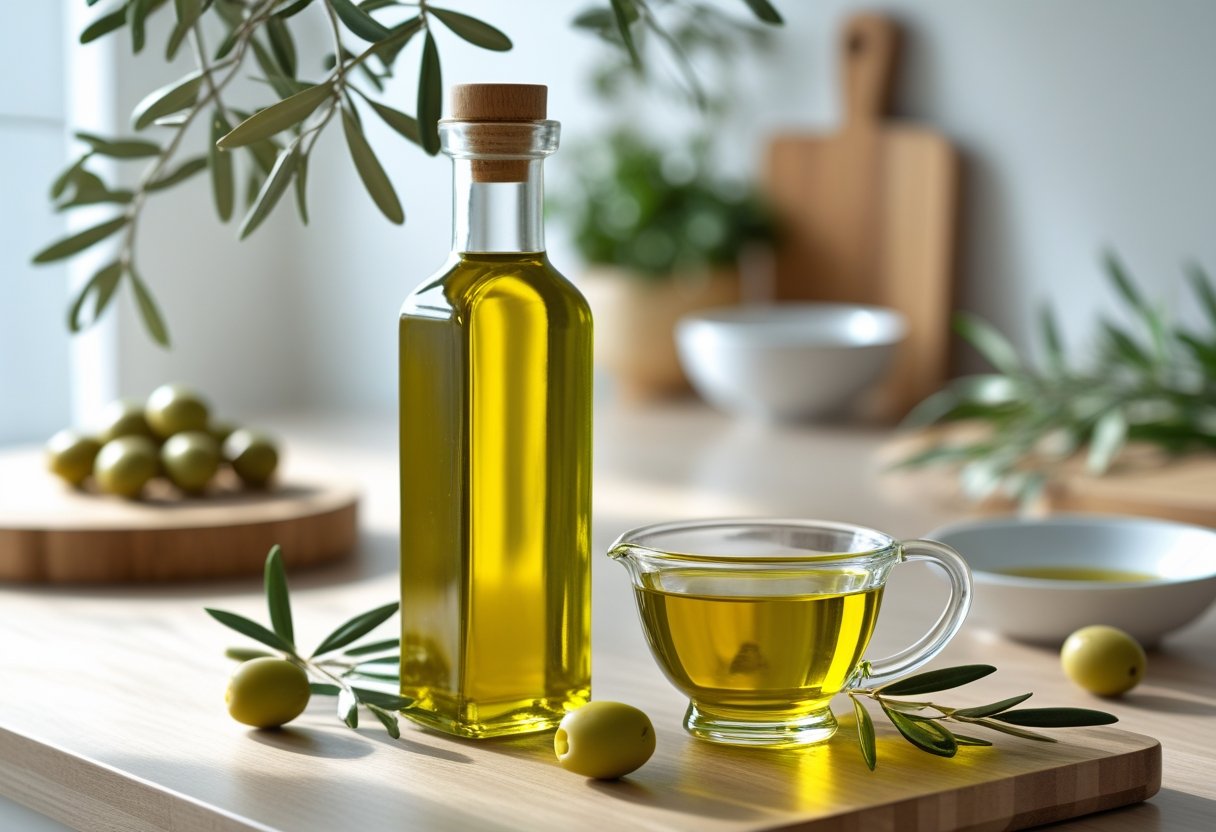
Getting the most from drinking olive oil[9] requires selecting premium products and following proper storage methods. The timing and method of consumption also play key roles in maximizing health benefits.
Choosing High-Quality Olive Oil
Extra virgin olive oil (EVOO) stands as the gold standard for drinking. This grade contains the highest levels of beneficial compounds like polyphenols and antioxidants.
Look for bottles with harvest dates within the past 18 months. Fresh olive oil delivers more potent health benefits than older products.
Dark glass bottles protect the oil from light damage. Avoid clear containers that expose the contents to harmful UV rays.
First cold-pressed labels indicate minimal processing. This method preserves more nutrients compared to refined oils.
Check for certification seals from reputable organizations. These marks verify authenticity and quality standards.
Single-origin oils often provide superior taste and purity. They come from one specific region rather than blended sources.
Price reflects quality in most cases. Premium extra virgin olive oil[10] costs more but offers better health returns.
Proper Storage and Freshness
Store olive oil in cool, dark places away from heat sources. Kitchen cabinets work better than countertops near stoves.
Temperature should stay between 60-70°F for optimal preservation. Extreme heat breaks down beneficial compounds quickly.
Keep bottles tightly sealed after each use. Oxygen exposure causes rancidity and reduces nutritional value.
Use opened bottles within 3-4 months for best quality. Even high-grade EVOO loses potency over time.
Refrigeration extends shelf life but may cause cloudiness. This appearance change doesn’t affect quality or safety.
Never store olive oil near windows or bright lights. UV radiation destroys delicate antioxidants and creates off-flavors.
Small bottles work better than large ones for regular drinkers. This approach ensures fresher oil consumption.
How to Incorporate Olive Oil Into Your Routine
Start with one tablespoon daily on an empty stomach. Morning consumption[11] may enhance absorption and provide steady energy.
Mix olive oil with lemon juice or water to improve palatability. Pure oil can feel too intense for beginners.
Take it 30 minutes before breakfast for digestive benefits. This timing allows the oil to coat the stomach lining.
Gradual increases work best for building tolerance. Some people experience mild nausea when starting too quickly.
Room temperature oil tastes smoother than cold versions. Let refrigerated bottles warm up before drinking.
Chase with a small amount of citrus juice if needed. This combination masks any bitter notes while adding vitamin C.
Consider splitting the daily amount into two smaller doses. This approach may reduce digestive discomfort for sensitive individuals.
Comparing Drinking Olive Oil vs. Cooking With Olive Oil
Both methods deliver healthy fats and antioxidants, but they differ in absorption rates and calorie density. The Mediterranean diet shows how cooking with olive oil can be just as beneficial as drinking it straight.
Benefits and Drawbacks of Each Method
Drinking olive oil[12] provides quick absorption of nutrients. The body can process the healthy fats and antioxidants without other foods interfering.
Benefits of drinking olive oil:
- Fast nutrient absorption
- No heat damage to compounds
- Easy to measure exact amounts
Drawbacks include:
- Very high calorie density
- Can cause stomach upset
- Less enjoyable than food
Cooking with olive oil offers better integration with meals. The oil helps absorb fat-soluble vitamins from other foods like vegetables.
Cooking benefits:
- Better taste experience
- Helps absorb other nutrients
- More sustainable habit
- Lower risk of overconsumption
Cooking drawbacks:
- Heat can reduce some antioxidants
- Harder to track exact amounts
- May use more than needed
Mediterranean Diet as a Model
The traditional Mediterranean diet[13] uses olive oil primarily in cooking and food preparation. This approach has shown strong health benefits in research studies.
Mediterranean people drizzle olive oil on salads, use it for cooking vegetables, and dip bread in it. They rarely drink it straight.
Studies show this food-based approach works well for heart health. The oil combines with other healthy foods like vegetables and fish.
Expert recommendations[14] suggest two tablespoons daily from all sources. This amount works whether someone drinks it or uses it in cooking.
The Mediterranean model shows that cooking with olive oil can deliver the same health benefits as drinking it. The key is using high-quality extra virgin olive oil consistently.
Frequently Asked Questions
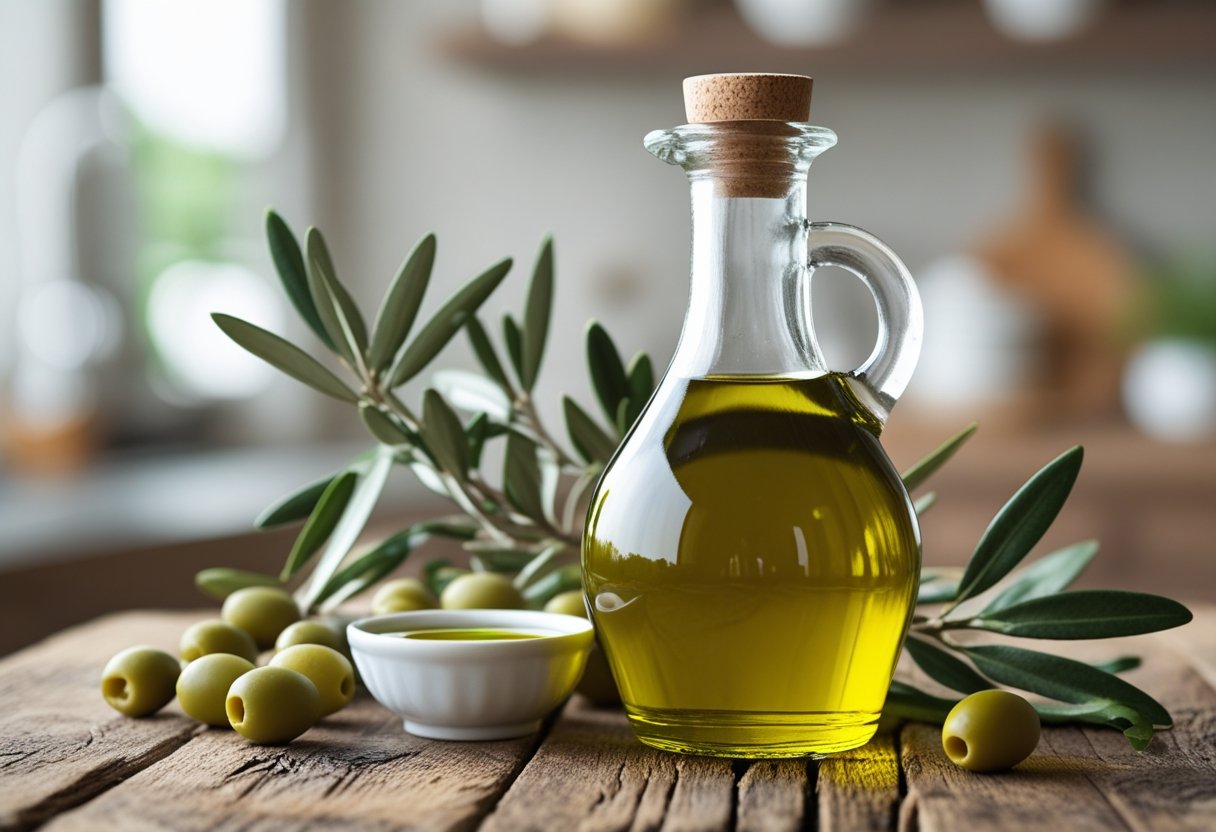
Most people can safely consume 1-4 tablespoons of olive oil daily for health benefits. The exact amount depends on individual factors like activity level, overall diet, and health goals.
What are the health benefits of consuming olive oil regularly?
Olive oil provides powerful antioxidants called polyphenols that fight cell damage. These compounds help protect against aging and disease by reducing oxidative stress in the body.
Regular consumption supports heart health by improving cholesterol levels. The monounsaturated fats in olive oil keep blood vessels flexible and reduce the risk of heart disease.
Studies show that consuming just over half a tablespoon daily can lower dementia risk by 28%[1]. This benefit occurs regardless of a person’s overall diet quality.
The oil also helps the body absorb fat-soluble vitamins A, D, E, and K. When paired with vegetables like tomatoes and spinach, it increases nutrient absorption significantly.
Is it safe to consume olive oil every day, and if so, in what quantities?
Daily olive oil consumption is generally safe[15] for most healthy adults. The key is finding the right amount for individual needs and health goals.
One tablespoon provides about 120 calories and offers minimum heart health benefits. Two tablespoons deliver 240 calories and represent the standard daily intake for most people.
Four tablespoons contain 480 calories and mark the upper recommended limit. People should account for calories from other fat sources like nuts, avocados, and seeds.
Those with specific health conditions should consult healthcare providers before increasing intake. The amount should fit within overall daily calorie needs.
What are the recommended dosages of extra virgin olive oil for daily consumption?
The standard recommendation ranges from 1-4 tablespoons daily[1] depending on individual factors. Active athletes typically need more than sedentary individuals.
One tablespoon equals three teaspoons or about the size of a poker chip. Two tablespoons equal six teaspoons or roughly the size of a golf ball.
People focused on heart health may benefit from 2-4 tablespoons daily. Those managing weight should aim for 1-2 tablespoons to control calories.
The amount should replace other fats rather than add extra calories. Consider existing dietary fats when determining the ideal daily portion.
Can the regular intake of olive oil help with inflammation, and how much should be consumed?
Extra virgin olive oil contains anti-inflammatory compounds that reduce chronic inflammation. The polyphenols work similarly to anti-inflammatory medications but more gently.
Two tablespoons daily provide enough anti-inflammatory compounds for most people. This amount delivers sufficient polyphenols to create measurable effects in the body.
The anti-inflammatory benefits build up over time with consistent use. Daily consumption is more effective than occasional large amounts.
Quality matters significantly for anti-inflammatory effects. Extra virgin olive oil contains higher levels of beneficial compounds than refined versions.
What is the maximum amount of olive oil that should be consumed in a day without adverse effects?
Four tablespoons represent the upper safe limit for most healthy adults. This amount provides 480 calories, which fits into most daily calorie budgets.
Consuming more than four tablespoons can lead to excessive calorie intake. This may interfere with weight management and overall diet balance.
Some people may experience digestive discomfort with large amounts. Starting with smaller quantities allows the body to adjust gradually.
The maximum safe amount varies based on body size and activity level. Larger, more active individuals can typically handle higher amounts safely.
How does the timing of consuming olive oil impact its potential benefits for weight loss and general health?
Consuming olive oil with meals provides better results than taking it alone. The fat helps slow digestion and improves blood sugar stability.
Taking olive oil with food increases satiety and reduces hunger between meals. This natural appetite control can support weight management goals.
The oil enhances absorption of fat-soluble vitamins when consumed with vegetables. Pairing it with nutrient-rich foods maximizes health benefits.
Using olive oil as a finishing drizzle preserves more beneficial compounds than cooking at high heat. Adding it after cooking protects delicate polyphenols from breaking down.
References
- How Much Olive Oil Per Day: Your Complete Daily Intake Guide – Learn Olive Oil. https://learnoliveoil.com/2025/06/20/how-much-olive-oil-per-day/ Accessed November 3, 2025
- benefits can be seen with as little as half a teaspoon daily. https://www.verywellhealth.com/olive-oil-11730688 Accessed November 3, 2025
- How to Consume Olive Oil Daily for Better Health. https://www.theolivetap.com/our-blog/how-to-consume-olive-oil-daily-for-better-health Accessed November 3, 2025
- How Much Olive Oil Per Day Should You Consume. https://www.oliveoil.com/how-much-olive-oil-per-day/ Accessed November 3, 2025
- One tablespoon of any olive oil provides 119 calories and 14 grams of fat. https://www.verywellfit.com/olive-oil-nutrition-facts-calories-and-health-benefits-4120274 Accessed November 3, 2025
- Understanding Healthy Olive Oil Consumption for Daily Intake. https://discover.texasrealfood.com/the-art-of-enough/how-much-olive-oil-is-healthy-to-consume-daily Accessed November 3, 2025
- What happens if you drink a full cup of olive oil?. https://www.restonyc.com/what-happens-if-you-drink-a-full-cup-of-olive-oil/ Accessed November 3, 2025
- Is Too Much Olive Oil Bad for You? - The Facts and Risks Explained - Italian Cooking and Living. https://www.italiancookingandliving.com/is-too-much-olive-oil-bad-for-you/ Accessed November 3, 2025
- Drinking Olive Oil: 8 tips You Need to Know and How to Do It Right. https://www.virgeen.com/drinking-olive-oil/ Accessed November 3, 2025
- Just a moment.... https://druggenius.com/nutrition/best-olive-oil-to-drink-daily/ Accessed November 3, 2025
- When to Drink Olive Oil for Maximum Health Benefits. https://juiceradvices.com/when-to-drink-olive-oil/ Accessed November 3, 2025
- Drinking Olive Oil: Good or Bad?. https://www.healthline.com/nutrition/drinking-olive-oil Accessed November 3, 2025
- Is drinking olive oil better than consuming it with food? – kyoord. https://kyoord.com/blogs/learn/is-drinking-olive-oil-better-than-consuming-it-with-food Accessed November 3, 2025
- Drinking Olive Oil Daily. https://oliveoilwolf.com/how-much-olive-oil-should-i-drink-per-day/ Accessed November 3, 2025
- How Much Olive Oil a Day for Heart Health: A Comprehensive Guide – CYMBIOTIKA. https://cymbiotika.com/blogs/heart-health/how-much-olive-oil-a-day-for-heart-health-a-comprehensive-guide Accessed November 3, 2025
